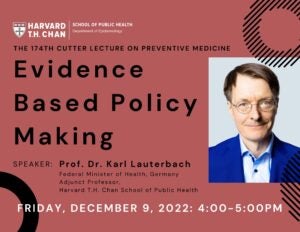Since 1912, the Cutter Lecture on Preventive Medicine has been one of the most respected institutionalized lectures in the fields of preventive medicine and Epidemiology. The Cutter lectures are administered by the Department of Epidemiology at the Harvard T.H. Chan School of Public Health under the terms of the bequest from John Clarence Cutter, MD a graduate of the Harvard Medical School. In his will Dr. Cutter specified that the lectures should concern preventive medicine, should be delivered in Boston and should be free to the medical profession and the press.
The changing character of public health interests is reflected in the history of the Cutter lectures, but all have remained dedicated to enhancing the physical and social welfare of the world’s population.
The lecturers themselves have come from a variety of countries and fields of interest. While the majority of lecturers have been either American or British, many of the other European countries are represented, as well as the continents of Asia and Africa. Lecturers have been some of the most distinguished public health scientists, researchers and professionals, including the founders of modern Epidemiology and Nobel Prize recipients.
Persons with disabilities who would like to request accommodations or have questions about physical access may contact cliebent@hsph.harvard.edu in advance of the program or visit.
The Harvard Chan School hosts a diverse array of speakers, invited to share both scholarly research and personal perspectives. They do not speak for the School, and hosting them does not imply endorsement of their views, organizations, or employers.
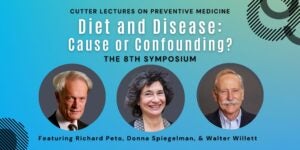 Cutter Lectures on Preventive Medicine
Cutter Lectures on Preventive Medicine
Diet and Disease: Cause or Confounding?
The 8th Symposium
Friday, May 3, 2024
2:00-4:00PM
Open to the public
In-person at:
Harvard T.H. Chan School of Public Health
677 Huntington Avenue
Snyder Auditorium (Kresge G1)
Boston, MA 02115
4:00-6:00pm, Reception at Sebastian’s Cafe
This is an-person event with limited seating. Seats in the main auditorium are first come, first served. There will also be a livestream of the event for those who cannot attend.
Schedule of speakers:
| 2:00PM | Welcome
Albert Hofman, MD, PhD |
| 2:05PM | Quantifying Regression Dilution and Residual Confounding
Richard Peto, FRS When regression analyses relate an outcome (y) to an explanatory factor (x), even purely random errors (or “noise”) in the measured values of the explanatory factor x systematically weaken the slope of the regression line of y on x, diluting the explanatory power of x (regression dilution). Likewise, when multiple regression is used to correct for a confounding factor (x), purely random errors in the measured values of the confounding factor x systematically weaken the magnitude of that correction, so some confounding remains (residual confounding). These two potentially substantial biases are both directly proportional to 1-r2, where r is the correlation coefficient between the exact values and the noisy values of x. |
| 2:35PM | The Limits of Confounding, the Boundlessness of Measurement Error
Donna Spiegelman, ScD It has been claimed that confounding is the major source of bias in epidemiology, and why epidemiology ‘gets it wrong’. Upon infinite replicates of the same trial – an unrealistic scenario — and in large single trials, randomization will balance measured, unmeasured, and still to be discovered confounders. Cornfield (1954) showed that confounding bias is limited by the minimum of the confounder-outcome relative risk, the confounder-exposure association, and the confounder prevalence. These bounds are tight, explaining why confounding adjustment often has little impact on results. On the other hand, measurement error is widespread, including in randomized nutrition trials where non-adherence may feature prominently. In contrast, measurement error bias is boundless. These remarks will be elaborated upon and illustrated by prominent examples. |
| 3:05PM | Diet and Disease: Remember Bradford Hill
The early years of nutritional epidemiology were focused on measurement error in dietary assessment methods because a hypothesized effect of dietary fat on breast cancer risk was not observed in large cohort studies. Detailed studies of questionnaire validity have shown that important associations with disease outcomes will not be missed if repeated measures are obtained and appropriate temporal relationships are examined. When positive associations are seen, confounding is always a concern, but this can be addressed by careful study design and analysis although the effects of different constituents of foods will be challenging to distinguish. As most dietary hypotheses will be difficult to evaluate with randomized trials, the best evidence will usually be a combination of long term cohort studies and randomized trials with intermediate endpoints. |
| 3:35PM | General Discussion |
| 3:55PM | Closing by Albert Hofman |
| 4:00PM | Reception, Sebastian’s Café, 1st Floor Kresge building |
| 6:00PM | Reception ends |
The 175th Cutter Lecture on Preventive Medicine
Friday, December 8, 2023
4:00-5:00PM
An Action-Oriented Response to Public Health:
Where We Were, Where We Are, and Where We Need to Go
Speaker:
Rochelle Walensky, MD, MPH
Fellow, Petrie Flom Center, Harvard Law School
Women and Public Policy Program, Harvard Kennedy School
Executive Fellow, Harvard Business School
Location:
Harvard T.H. Chan School of Public Health
677 Huntington Avenue, Boston, MA 02115
Snyder Auditorium (Kresge G1)
5:00-7:00pm Reception, Kresge Cafeteria
Open to the public
Abstract: The Centers for Disease Control and Prevention is a 76 year-old agency and a national treasure that, for many, first came to the public’s eye in February 2020 as the earliest cases of Covid-19 reached American shores. I had the great privilege of leading the CDC for some of the most trying years of its history. Using examples from some of the public health challenges during my tenure – from Covid to Mpox to paralytic polio – I will unpack the details as to how and why some decisions were made. I will outline some of the major challenges in public health that lie ahead – from workforce to data and laboratory infrastructure to limited authorities that constrain the ability of the CDC to swiftly act in the face of infectious threats. And, I will leave plenty of time for questions to shed some light on my wholly unexpected transition from serving as a physician-scientist leader in academia to heading a federal agency of 12,000 in the midst of a once-in-a-century pandemic.
This is an-person event with limited seating. Seats in the main auditorium is first come, first served. There is additional seating in the overflow room. There will also be a livestream of the event for those who cannot attend.
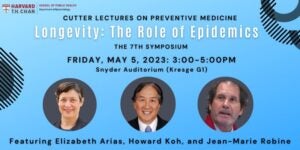 Cutter Lectures on Preventive Medicine
Cutter Lectures on Preventive Medicine
Longevity: The Role of Epidemics
The 7th Symposium
Friday, May 5, 2023
3:00-5:00PM
Open to the public
Watch Recording
In-person at:
Harvard T.H. Chan School of Public Health
677 Huntington Avenue
Snyder Auditorium (Kresge G1)
Boston, MA 02115
5:00-7:00pm
Reception (Sebastian’s Cafe)
This is an-person event with limited seating. Tickets are for seating in either the main auditorium or the overflow room. Seats in the main auditorium are first come, first served. There will also be a livestream of the event for those who cannot attend.
| 3:00PM | Welcome
Albert Hofman, MD, PhD |
| 3:05PM | Life expectancy trends in the United States and the impact of drug-overdose and COVID-19 mortality
Elizabeth Arias, PhD The presentation will provide a historical view of trends in life expectancy at birth by race and Hispanic origin in the United States. The effects of changes over time in cause-specific mortality on changes in life expectancy will be discussed. The talk will give special emphasis to the impact on life expectancy of increases in drug-overdose mortality during the past two decades and increases in excess deaths due to the COVID-19 pandemic. Disparities by race and Hispanic origin in the effects of these recent changes in cause-specific mortality will be presented. |
| 3:35PM | Trends in life expectancy in Western European countries and other indicators of longevity
Jean-Marie Robine, PhD Between the trends in life expectancy observed in Japan and the United States of America, what can we learn from the trends observed in Western Europe when the main assumptions about the limits of human longevity are based on European data? This paper compares and discusses recent trends in life expectancy in the main Western European countries. Possible causes of the observed trends, heat waves, flu epidemics, Covid-19 will be discussed. |
| 4:05PM | Public Health Strategies for Addressing the Opioid Crisis
Howard Koh, MD This session will describe the rising toll of US drug overdose deaths with a focus on the growing contribution of the opioid epidemic. it will focus on dynamic aspects of the epidemiology that have contributed to striking declines in US life expectancy through the pandemic. The 2022 Stanford- Lancet Commission on the North American Opioid Crisis offers a comprehensive analysis of root causes of these trends and public health strategies to address them. The speaker will review the interdisciplinary recommendations from that Commission and emphasize the need for a public health approach to address stigma and advance treatment, harm reduction, recovery and prevention. |
| 4:25PM | Q&A and General Discussion
Moderated by Albert Hofman |
| 4:50PM | Closing by Albert Hofman |
Watch Recording
Friday, December 9, 2022
4:00-5:00PM ET
174th Cutter Lecture on Preventive Medicine
Evidence Based Policy Making
Prof. Dr. Karl Lauterbach
Federal Minister of Health, Germany
Adjunct Professor
Harvard T.H. Chan School of Public Health
Location:
Harvard T.H. Chan School of Public Health
677 Huntington Avenue, Boston, MA 02115
Snyder Auditorium (Kresge G1)
Open to the public
Registration is closed for in-person attendance.
This is an-person event with limited seating. Seats in the main auditorium is first come, first served. There is additional seating in the overflow room. There will also be a livestream of the event for those who cannot attend.
5:00-7:00 Reception Following in Sebastian’s Cafe
 Cutter Lectures on Preventive Medicine
Cutter Lectures on Preventive Medicine
The 6th Cutter Symposium: Epidemiology and Causes
Friday, May 6, 2022
3:00-5:00PM ET
Open to the public
Watch Recording
Schedule of Speakers:
| 3:00PM | Welcome
Albert Hofman, MD, PhD |
| 3:05PM | Ubiquitous Causes: Can They Be Identified?
George Davey Smith, MD, DSc, FRS |
| 3:40PM | Testing Causal Claims: We Can Do Better
Maria Glymour, ScD, MS |
| 4:15PM | Make Up Your Mind: Is Causal Inference from Observational Data a Legitimate Scientific Task?
Miguel Hernán, MD, DrPH |
| 4:50PM | Closing by Albert Hofman
|
Friday, December 10, 2021
4:30-5:30PM ET
173rd Cutter Lecture on Preventive Medicine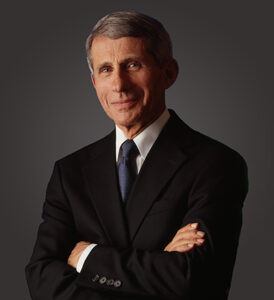
COVID-19: Lessons Learned and Remaining Challenges
Anthony S. Fauci, MD
Director, National Institute of Allergy and Infectious Diseases (NIAID)
Chief, NIAID Laboratory of Immunoregulation
National Institutes of Health, Bethesda, Maryland
Cutter Lectures on Preventive Medicine
The 5th Cutter Symposium: Epidemiology and Racism
Friday, May 14, 2021
3:00- 4:00 PM EST
The 172nd Cutter Lecture on Preventive Medicine
Friday, May 14, 2021
4:15- 5:15 PM EST
See full schedule of events below
Schedule for
Cutter Lectures on Preventive Medicine
The 5th Cutter Symposium: Epidemiology and Racism
Friday, May 14, 2021
3:00- 4:00 PM
Welcome by Albert Hofman, MD, PhD
Stephen B. Kay Family Professor of Public Health and Clinical Epidemiology
Chair, Department of Epidemiology, Harvard T.H. Chan School of Public Health
3:00PM Covid-19: A Tutorial on Racism
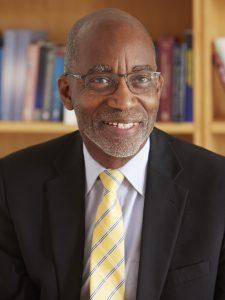
David R. Williams, PhD
Florence Sprague Norman and Laura Smart Norman Professor of Public
Health, Chair, Department of Social and Behavioral Sciences
Harvard T.H. Chan School of Public Health
3:20PM Reducing Racial Disparities in the Criminal Justice System
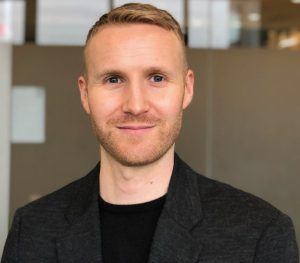
Will Dobbie, PhD
Professor of Public Policy
Harvard Kennedy School
3:40PM Epidemiology, Structural Racism, & the Two-Edged Sword of Data: Structural Problems Require Structural Solutions
Nancy Krieger, PhD 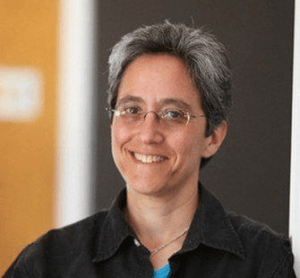
Professor of Social Epidemiology
Department of Social and Behavioral Sciences
Harvard T.H. Chan School of Public Health
Schedule for The 172nd Cutter Lecture on Preventive Medicine
Welcome by Albert Hofman, MD, PhD
Stephen B. Kay Family Professor of Public Health and Clinical Epidemiology
Chair, Department of Epidemiology, Harvard T.H. Chan School of Public Health
Introduction by Dean Michelle Williams, Sc.D.
Dean of the Faculty, Harvard T.H. Chan School of Public Health
Angelopoulos Professor in Public Health and International Development,
Harvard T.H. Chan School of Public Health and Harvard Kennedy School
4:15PM To Race with the World: John Henryism and the Health of Black Americans
Sherman A. James, PhD
Susan B. King Distinguished Professor Emeritus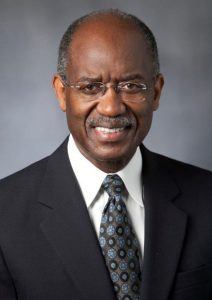
Sanford School of Public Policy
Duke University
5:15PM Cutter Plaque Presentation and Close
Harvard Oxford Program in Epidemiology (HOPE) Mini-Symposium
Rapid Testing for COVID-19: Does it Have a Role in COVID Control?
Thursday, February 25, 2021
9:00-10:30AM EST/2:00-3:30PM GMT
9:00AM: Welcome and Introduction
Albert Hofman, MD, PhD
Stephen B. Kay Family Professor of Public Health and Clinical Epidemiology
Chair, Department of Epidemiology, Harvard T.H. Chan School of Public Health
9:05AM: COVID-19 Testing: Where Science, Policy and Regulation Collide
Michael Mina, MD, PhD
Assistant Professor of Epidemiology
Department of Epidemiology, Harvard T.H. Chan School of Public Health
9:30AM: Discussant
David Hunter, MBBS, ScD
Richard Doll Professor of Epidemiology and Medicine Nuffield Department of Population Health, University of Oxford; Vincent L. Gregory Professor in Cancer Prevention, Emeritus Harvard T.H. Chan School of Public Health
9:35AM: Can Lateral Flow Tests Be Used to Identify Non-Infectious Individuals?
Tim Peto, PhD
Professor of Medicine
Co-Leader for the Infection Theme of the Oxford Biomedical Research Center
Nuffield Department of Medicine, University of Oxford
10:00AM: Discussant
Marc Lipsitch, D.Phil
Professor of Epidemiology
Department of Epidemiology, Harvard T.H. Chan School of Public Health
10:05AM: Questions and General Discussion
10:25AM: Closing Remarks
